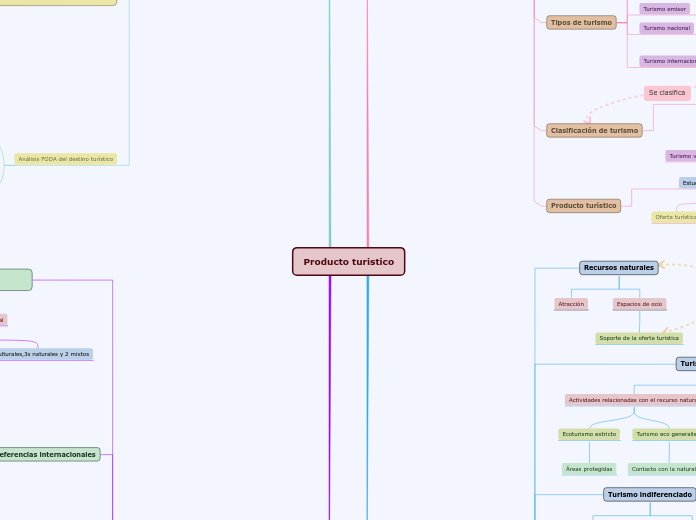par Andrea Amador Polo Il y a 5 années
1000
Producto turistico

par Andrea Amador Polo Il y a 5 années
1000

Plus de détails
In linguistics, syntax is the set of rules, principles, and processes that govern the structure of sentences in a given language, usually including word order.
A compound sentence is a sentence that has at least two independent clauses joined by a comma, semicolon or conjunction. An independent clause is a clause that has a subject and verb and forms a complete thought.
Create your own compound sentences, using the coordinators above.
When independent clauses are joined with coordinators (also called coordinating conjunctions), commas and semicolons, they do more than just join the clauses. They add meaning and flow to your writing.
37 culturales,3s naturales y 2 mixtos
42 se encuentran en territorio Español
A complex sentence is a sentence that contains an independent clause and one or more dependent clauses.
An independent clause can stand alone as a sentence, but a dependent clause even though it has a subject and a verb cannot stand alone.
Amenazas
Debilidades
Oportunidades
Fortalezas
The subject clause is a dependent clause that acts as a subject.
Uso de tecnología
Terrorismo
Narcotráfico
Empleo por cápita
Taza de interés
Tipo de cambio
A predicative clause may be introduced by conjunctions - that, whether, whether... or, as, as if, as though, because, lest, the way - or connectives.
The latter may be conjunctive pronouns - who, whoever, what, whatever, which - or conjunctive adverbs - where, wherever, when, whenever, how, why.
perfil del turista
Fcehas del viaje
Safiscacion del viaje
Contratacion de servicio
Hábitos de viaje
Nivel planeación de viajes
Estado civil
Edad
Ingreso anual
Nivel socioeconómico
Lugar de origen
Perspectivas
Crecimiento del mercado
Estabilidad de demanda
Gasto medio
Estacionalidad/Periodicidad
Porcentaje sobre pernoctaciones
Volumen total de demanda
Análisis de las inversiones
Análisis de la oferta turística
Análisis de la demanda turística
The object clause is a phrase on which a verb performs an action. It falls at the end of a sentence, and is governed by a verb or a preposition.
Energía, agua ,salud, bancos
Hospedaje, restaurantes y tiendas
Practicas a realizar
Naturales, culturales y eventos
Sistema de transporte
Valoración
sustentabilidad futura
Calidad ambiental actual
Tipos de uso
Recursos orientados hacia el usuario
Recursos recreativos
Accecivilidad
Paisaje con componente de acción antrópica intensiva
Paisaje con componente de acción antrópica
Paisaje natural
Heterongecidad
Densidad
Singularidad
Factores fisicos tangibles
Crecimiento de la actividad turística aceptable por el medio natural
Permanecer un manjo y politicas sostenibles
Mejor condiciones de vida
Competitividad a largo plazo
See the example below and try to create your own simple sentences.
Tim is driving the red car.
administrativo
socioecológico
sociocultural
Biofisico
See the example below and try to create your own simple sentences.
Tim is driving the car with his mother.
See the example below and try to create your own simple sentences.
Tim is the driver.
See the example below and try to create your own simple sentences.
Tim drives the car.
Visitas breves en areas naturales protegidas
Ecoturismo blando
Turismo eco generalista
Contacto con la naturaleza
Ecoturismo extricto
Áreas protegidas
See the example below and try to create your own simple sentences.
Tim drives.
Soporte de la oferta turistica
An adverbial is an individual word (that is, an adverb), a phrase, or a clause that can modify a verb, an adjective, or a complete sentence.
Suministran la planta turistica
Oferta turística
The attribute is defined as a quality or characteristic of a person, place or thing.
Turismo de afinidad
Turismo especializado
Turismo vacaional
The predicative is defined as an adjective or noun forming or contained in the predicate.
Its main trait is that it serves to express a property that is assigned to a 'subject'.
For e.g.: The dog is old.
Visitantes recientes dentro y fuera de territorio
visitantes recidentes fuera de territorio
Visitantes residentes
Usuarios no residentes
Traditional grammar defines the object in a sentence as the entity that is acted upon by the subject.
Viajeros de cruceros
The indirect object identifies the person/thing for whom/which the action of the verb is performed.
The indirect object is usually a person or a thing.
Por motivos
Recreo
Negocios
Religión
Vcaciones
Salud
The predicate of a sentence is the part that modifies the subject in some way. Because the subject is the person, place, or thing that a sentence is about, the predicate must contain a verb explaining what the subject does and can also include a modifier.
Reservaciones
Alojamiento
The subject of a sentence is the person, place, thing, or idea that is doing or being something. You can find the subject of a sentence if you can find the verb.
Ask the question, 'Who or what 'verbs' or 'verbed'?' and the answer to that question is the subject.
Gustos de las personas
Deceos
Tiempo libre
Comunicaciones
Paz
Prosperidad